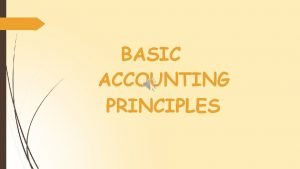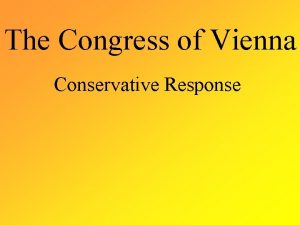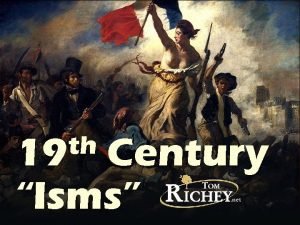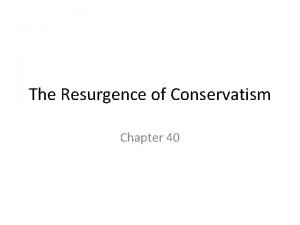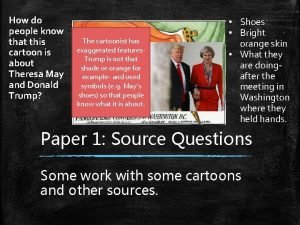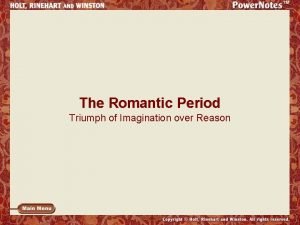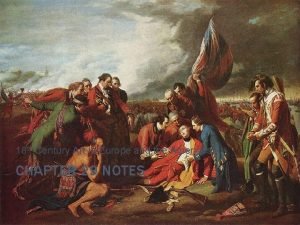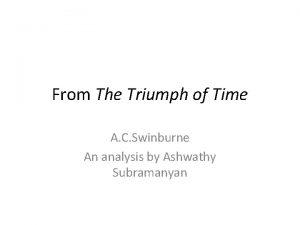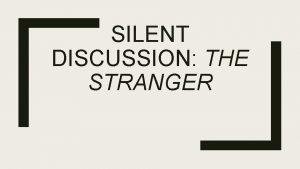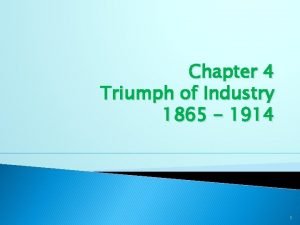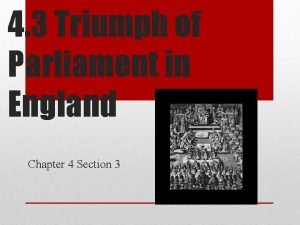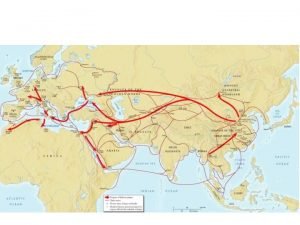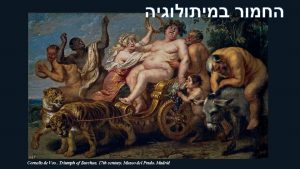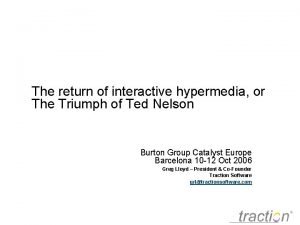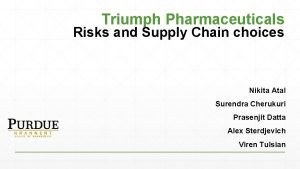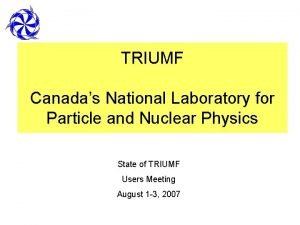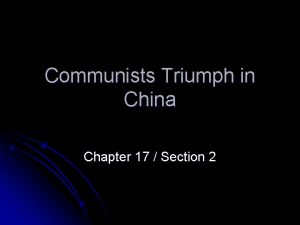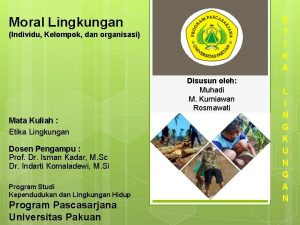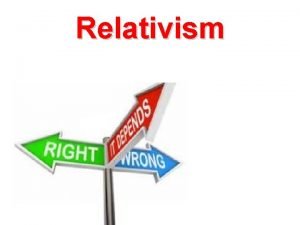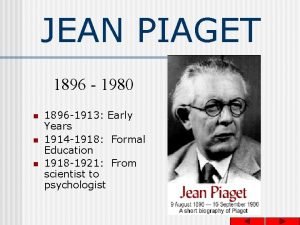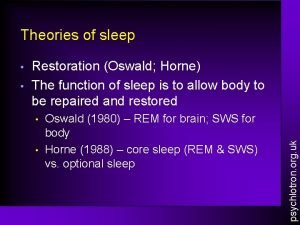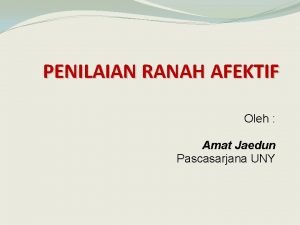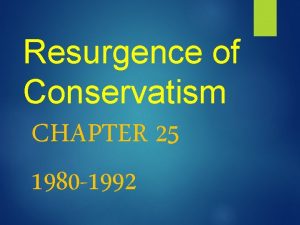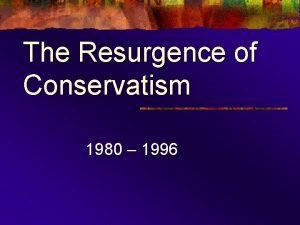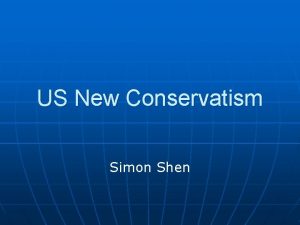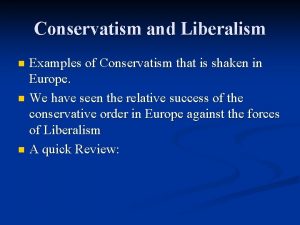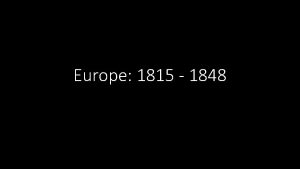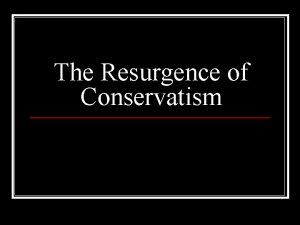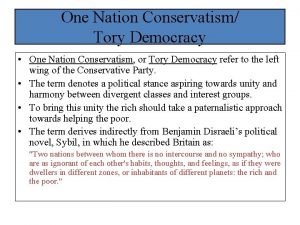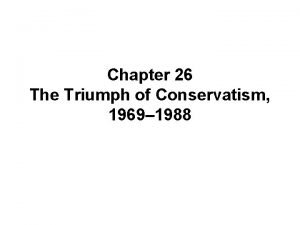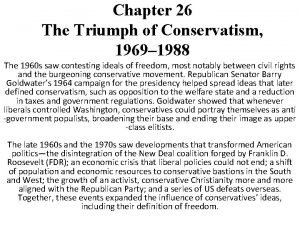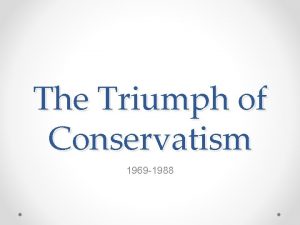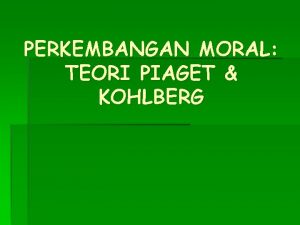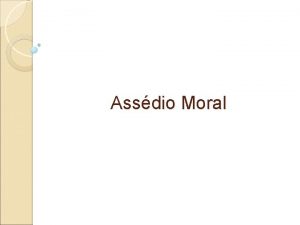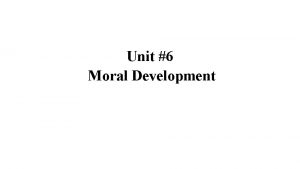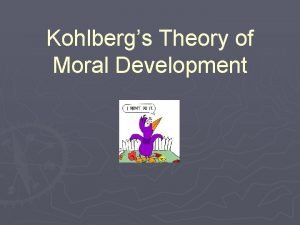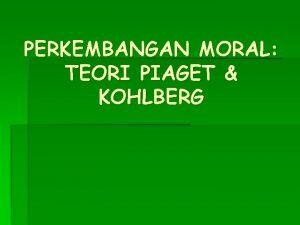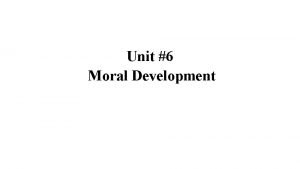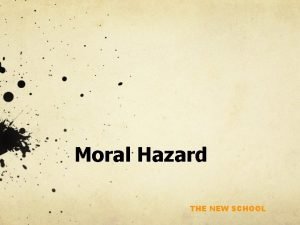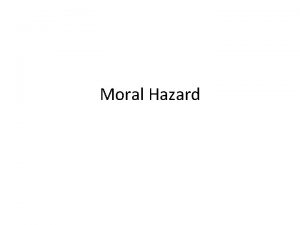THE 1980 SPRESENT TRIUMPH OF CONSERVATISM THE MORAL

































- Slides: 33

THE 1980 S-PRESENT

TRIUMPH OF CONSERVATISM: THE MORAL MAJORITY The traditional family seemed under siege, as divorce rates and births to single mothers soared. • Sexually explicit media, an outspoken gay rights movement, and the availability of legal abortions struck many religious conservatives as part of a wholesale assault on decency. Increasingly the political agenda was determined by those who wanted to restore a strong family, traditional religious values, patriotism, and limited government.

THE ELECTION OF 1980: THE REAGAN REVOLUTION

RONALD REAGAN: THE GREAT COMMUNICATOR • Former Actor. • Charming and cheerful. • Superb analyst of the public mood. • Assassination attempt • “The Teflon President” • Public affection for him as a person.

REAGANANOMICS • Economy: changes role of government • “Government is the problem” • Market should control economy, not the government (deregulation of business) • Supply-side economics • Tax cuts will actually raise government revenues that would help reduce the budget deficit because wealth will be increased. • The wealthy would engage in productive investment. “trickle down”

EFFECTS OF REAGANOMICS ON THE ECONOMY • Economic Recovery Act (1981) • Cut personal income taxes by 25% • Lowered max from 70% to 50% • Reagan tax cuts, however, were accompanied by massive increases in defense spending. • The combination of massive defense spending and substantial tax cuts left the federal government with massive deficits.

THE END OF THE COLD WAR • Reagan Doctrine-- Reagan believed that the United States should support guerrilla groups who were fighting to overthrow Communist or pro-Soviet governments. Not just containment but rollback. Examples include: • Aid to Afghan Rebels • Aid to Iraq versus Iran. • Aid to rebels in Nicaragua • The heart of the Reagan revolution was a sharp rise in military spending. Defense spending jumped about 50%.

THE IRAN-CONTRA AFFAIR • Scandal surfaced in his second administration (1986) • The Reagan administration had secretly and against the expressed orders of Congress sold weapons to Iran in an attempt to free U. S. hostages held in Lebanon by terrorists. • They then used money from the sale of these weapons to buy weapons for the Contra rebels in Nicaragua who were freedom fighters fighting against communism. • Marine Lieutenant-Colonel Oliver North had been running secret operations from the basement of the White House.

THE DEFENSE BUILDUP • Massive buildup of nuclear and conventional weapons to close the gap between Soviet and American military forces. • He also pushed the strategic defense initiative (SDI) • A space based anti-missile defense shield. • “Star Wars” • Forced the Soviets to launch an expensive research and development program of their own to keep pace.

A NEW SOVIET LEADERSHIP • He combined the increases in spending with strong rhetoric such as calling the Soviet Union an evil empire and demanding that the Berlin Wall come down. • By his second term, it was clear that the faltering Soviet economy would not be able to match the spending of the United States. • Mikhail Gorbachev’s election in 1985 brought a Soviet leader who wanted to bring domestic reform within the Soviet Union and improve relations with the U. S.

GLASNOST AND PERESTROIKA • Geneva Summit (1985) Reagan and Gorbachev met and signed several cultural and scientific agreements and promised arms limitation talks. • Glasnost: Openness, open discussion of political and social issues. • Perestroika Gorbachev instituted perestroika, or “restructuring, ” which allowed some private enterprise and profit making. He believed that private initiative would lead to innovation,

GEORGE H. W. BUSH • Despite the scandal, Reagan’s popularity remained high because of the improvement in Soviet-American relations and his V. P. George Bush won the 1988 election largely because of his connection to Reagan.

BUSH AND GORBACHEV • Bush was in many ways the perfect foreign policy president. • He sought to move “Beyond the Cold War. ” • Bush was pragmatic and was an expert at personal diplomacy. • Bush would guide the end of the Cold War so that it ended peacefully. • Gorbachev’s foreign policy sought rapprochement and trade with the West, to relieve the Soviet economy of burdensome military costs.

REVOLUTIONS OF 1989 • Soviet troops left Afghanistan in 1989. • Gorbachev repudiated the “Brezhnev Doctrine” • Communist party rule ended in Poland, Hungary, Czechoslovakia, Bulgaria, and Romania. • Fall of the Berlin Wall (November 9, 1989) • Reunification of Germany (October 3, 1990) • Germany in NATO • Warsaw Pact dissolved

AN END TO THE COLD WAR • Coup attempt against Gorbachev (August 1991) • Bush and Boris Yeltsin put public pressure on the coup leaders. • Gorbachev released. • The Communist party apparatus was dismantled. • Soviet Union Collapses • December 25, 1991, Gorbachev resigns and announces the end of the Soviet Union. • A new Commonwealth of Independent States made up of 12 autonomous republics.


BUSH’S DOMESTIC AGENDA • Bush had difficulty defining and asserting his own political identity on domestic issues. • “vision thing” • Americans with Disabilities Act (1990)

GULF WAR • The Gulf War • 1990 Iraq invades Kuwait • The U. S. dispatched troops to Saudi Arabia to prevent Iraq expansion. • Desert Shield • 1991 Operation Desert Storm launched • Air attack began on January 17 against Baghdad • Ground attack began on February 24 and lasted only 4 days • Cease fire on February 28 • 148 U. S. combat deaths / 145 noncombatant. • Saddam Hussein remained in power.


GEORGE H. W. BUSH • Bush seemed unbeatable • Approval rating – 91% • Bush was an expert in foreign policy; however, the Cold War was over. • Bush begins the process of downsizing the military. • Private businesses also began “restructuring” and “downsizing” • Economic recession • Bush administration assured Americans that the recession would be short and self-correcting. • “Peace dividend”

BUSH PROBLEMS • Economic recession • The huge deficit forced the government to borrow money to pay for its programs, keeping money from being available to businesses. • Savings and Loan Scandals • Had been set up by Reagan to help people buy homes. By 1989 hundreds of S&L’s had failed. • Bush tried to close or sell ailing S&L’s and bail out the depositors. • National Debt • $2. 6 trillion by 1988. • Taxes • 1990 - Bush approves a combination of tax hikes and spending cuts to reduce deficit despite “Read my lips, no new taxes” campaign pledge

THE ELECTION OF 1992 • George Bush (Rep) • Bill Clinton (Dem) • Moderate Governor of Arkansas • Stressed economic issues to win over working-class whites and blacks. • Made extensive use of polls to shape his stance on issues. Flip-flopped on controversial issues. "Slick Willie” • Personal Character • Chronic adulterer • Dodged the draft in Vietnam • Ross Perot (Independent) • Candidate of the Reform Party • Wealthy Texan

THE CLINTON PRESIDENCY • Health care reform plan • Government subsidized health care • Failed to muster the necessary support of Congress and the public. • Comprehensive economic program • Tax hikes for corporations and for individuals in higher tax brackets. • Increased “investment” in public works and in education, skills, health, and welfare. • Very controversial; narrowly passed. • “Don’t ask; don’t tell” policy for the military • North American Free Trade Agreement signed (NAFTA) 12/8/93

NAFTA • North American Free Trade Agreement • Bush negotiated NAFTA with Canada and Mexico • Tariff reductions would open up foreign markets to American industries. • Organized labor favored barriers against cheaper foreign products that might cost U. S. jobs. • Passed in 1993.

THE CLINTON PRESIDENCY ON TRIAL • The Conservative Revolution Reborn • • Midterm elections of 1994 Newt Gingrich (R-Speaker of the House in 1995) The “Contract with America” Welfare reform • Scandals • • • Whitewater fraud (S & L scandal) Paula Jones – Sexual harassment Monica Lewinsky affair (White House intern) Impeachment for perjury(1998) Acquittal (1999)

THE CLINTON PRESIDENCY: THE NEW WORLD DISORDER • Middle East Peace • Middle East peace negotiations • 1993 agreement between Israeli prime minister Yitzhak Rabin and PLO leader Yasser Arafat to restore Palestinian self-rule in the Gaza Strip and the West Bank. • Rabin assassinated in 1995.

APARTHEID ENDS • Apartheid: was a system of racial segregation in South Africa enforced through legislation by the National Party (NP), the governing party from 1948 to 1994.

THE CLINTON PRESIDENCY: THE NEW WORLD DISORDER • Americans in Haiti (1995) • Coup against Democratically-elected Jean-Bertrand Aristide. • Jimmy Carter sent to Port-au-Prince to negotiate • U. S. troops landed without opposition • Yugoslavian Turmoil (The Balkans) • Ethnic and religious conflicts in Bosnia and Croatia • Orthodox Serbs, Catholic Croats, and Bosnian or Albanian Muslims • NATO launched air strikes in 1995. Peacekeeping mission. • Intervention in Kosovo • Yugoslav President Slobodan Milosevic asserted Serbian control through martial law. • NATO launched air strikes in 1999

TERRORISM HITS HOME • On Feb. 26, 1993, an ugly new phase of terrorism was ushered in when Jordanian Eyad Ismoil drove Kuwaiti Ramzi Yousef and a 1, 300 -pound nitrate-hydrogen gas enhanced bomb also stuffed with cyanide into the parking garage below the World Trade Center in Manhattan. • The bomb killed six people and injured more than 1, 000 that day.

THE CLINTON PRESIDENCY: THE NEW WORLD DISORDER • The USS Cole Bombing • On October 12, 2000, suicide terrorists exploded a small boat alongside the USS Cole—a Navy Destroyer—as it was refueling in the Yemeni port of Aden. The blast ripped a 40 -foot-wide hole near the waterline of the Cole, killing 17 American sailors and injuring many more.

GEORGE W. BUSH • On September 11, 2001, 19 militants associated with the Islamic extremist group al-Qaeda hijacked four airliners and carried out suicide attacks against targets in the United States. • Jihad: a holy war undertaken as a sacred duty by Muslims. • War on Terror: After the terrorist attacks of September 11, 2001, the Bush administration declared a worldwide "war on terror, " involving open and covert military operations, new security legislation, efforts to block the financing of terrorism, and more. • Operation Enduring Freedom (OEF): is the official name used by the U. S. government for the War in Afghanistan to destroy al-Qaeda and capture or kill Osama bin-Laden • Operation Iraqi Freedom: was a military operation carried out by the US-led Coalition forces from March 20, 2003 • The main objectives of Operation Iraqi Freedom was to oust the secular dictator Saddam Hussein from power and seize the weapons of mass destruction which, according to intelligence sources, he had developed.

BARACK H. OBAMA • Withdraw from Iraq: began in December 2007 with the end of the Iraq War troop surge of 2007 and was completed by December 2011. • Killing Osama bin Laden • Araba Spring: is a revolutionary wave of demonstrations and protests (both non-violent and violent), riots, and civil wars in the Arab world that began on 18 December 2010 in Tunisia with the Tunisian Revolution, and spread throughout the countries of the Arab League and its surroundings. While the wave of initial revolutions and protests faded by mid-2012

ARAB SPRING
 Why did new conservatism rise
Why did new conservatism rise Going concern concept
Going concern concept Congress of vienna conservatism
Congress of vienna conservatism Conservatism
Conservatism The resurgence of conservatism
The resurgence of conservatism Triumph group
Triumph group Locarno pact cartoon
Locarno pact cartoon Triumph des willens
Triumph des willens The romantic triumph
The romantic triumph Triumph thruxton mods
Triumph thruxton mods Francois boucher triumph of venus
Francois boucher triumph of venus Ktm duke 125 2017 leistungssteigerung
Ktm duke 125 2017 leistungssteigerung Swinburne
Swinburne Did triumph
Did triumph Chapter 4 the triumph of industry
Chapter 4 the triumph of industry Lesson 3 triumph of parliament in england
Lesson 3 triumph of parliament in england Triumph of death
Triumph of death Triumph of bacchus
Triumph of bacchus Triumph investasi
Triumph investasi So gold can easily triumph defeat strongest man
So gold can easily triumph defeat strongest man Triumph pharmaceuticals
Triumph pharmaceuticals Triumph house ubc
Triumph house ubc Chapter 17 section 2 communists take power in china
Chapter 17 section 2 communists take power in china Interactive keypads suffolk
Interactive keypads suffolk Moral individu dan moral kelompok
Moral individu dan moral kelompok Moral de esclavos y moral de señores
Moral de esclavos y moral de señores Moral realism
Moral realism What happens if we leave afghanistan
What happens if we leave afghanistan Jean piaget (1896-1980)
Jean piaget (1896-1980) Icidh model
Icidh model Oswald's restoration theory of sleep
Oswald's restoration theory of sleep Contoh penilaian afektif sd
Contoh penilaian afektif sd Sale of goods and supply of services act 1980
Sale of goods and supply of services act 1980 1980-1896
1980-1896

